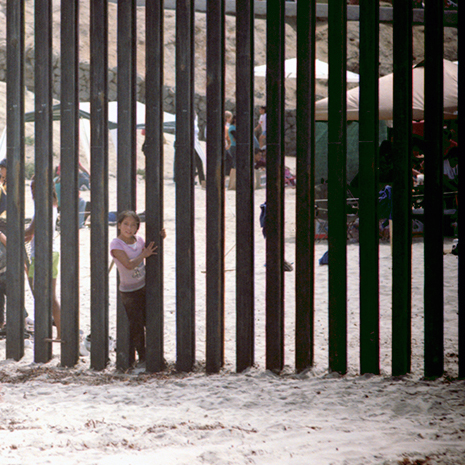WASHINGTON (RNS) Most Americans say the waves of children crossing into the United States from Central America are refugees fleeing danger at home. And they say the United States should support these children while reviewing their cases, not deport them immediately.

A Hispanic girl slips through the border fence separating the U.S. and Mexico at Border Field State Park in Southern California.
These largely sympathetic views come from all points along the political and religious spectrum, according to a new survey by the Public Religion Research Institute Tuesday (July 29).
Democrats (80 percent), independents (69 percent) and Republicans (57 percent) favor offering support to unaccompanied children while a process to review their cases gets underway.
Most major religious groups say the same, including white evangelical Protestants (56 percent), white mainline Protestants (67 percent), minority Protestants (74 percent), Catholics (75 percent) and the religiously unaffiliated (75 percent).
(The survey sample of 1,026 adults was not large enough to capture the views of smaller religious groups, such as Jews, Muslims or Mormons.)
“It makes a difference that we are talking about children facing violence and harm,” said Robert P. Jones, CEO of PRRI. “The value of keeping families together cuts across all party lines.”
As a result, most Americans can make a “pretty clear distinction between the problem of the children arriving from Central America and the problem of illegal immigration in general,” Jones said.
The survey found that overall attitudes toward immigrants are hardening somewhat, with a slight upward shift in the numbers who say they are a burden, not an asset, to the United States.
About one in four Americans (27 percent) see the children as illegal immigrants who should be deported. But 69 percent say they should be treated as refugees and allowed to remain in the United States if authorities determine it is not safe for them to be sent home.
However, Jones said, “even among those who say, in general, to identify and deport them, more than one in three nonetheless say in the case of the children, they would offer support and begin a process of considering if they could stay.”

A Public Religion Research Institute shows attitudes toward Central American children arriving at the border. Graphic by Emily Fetsch, courtesy of PRRI.
Almost no one thinks the children are traveling thousands of miles without their parents for trivial reasons. The children are seen as fleeing violence and serious threats to their safety at home (45 percent), seeking better education and economic opportunities (34 percent) or both (14 percent).
Seven in 10 Americans (70 percent) say the children should be offered shelter and support while there’s “a process to determine whether they should be deported or allowed to stay.”
Most (56 percent) say these children’s families are “doing what they can to keep their children safe in very difficult circumstances.” At the same time, however, 38 percent say those children’s families are “taking advantage of American good will and are really seeking a back door to immigrate to our country.”
And about one in four (26 percent) say they should be deported immediately.
Few minimize the seriousness of the situation — 36 percent consider it a crisis, and 43 percent call it “a serious problem but not a crisis.”
What to do with these children?
- Most surveyed (71 percent) said the U.S. should offer “refuge and protection” for those who come to the U.S. “when they are facing serious danger in their home country.”
- 71 percent also mostly agree that these Central American children waiting for their cases to be heard “should be released to the care of relatives, host families or churches rather than be detained by immigration authorities.” (Twenty-eight percent disagree.)
- However, only 39 percent would allow these children to stay for good while 59 percent don’t want them here long-term because it “will encourage others to ignore our laws and increase illegal immigration.”
The wave of children at the border is “impacting what Americans think about immigrants generally,” said Daniel Cox, PRRI research director, in a press release. In short, attitudes are becoming more polarized between those who see immigrants as an asset and those who see them as a burden.
In early April, most people (54 percent) said immigrants make the U.S. stronger with their “hard work and talents,” but that figure declined to 49 percent by last week. Meanwhile, more said immigrants “take our jobs, housing and health care” — rising from 38 percent to 42 percent.
Views on access to citizenship or permanent legal residency did not change significantly. Most today (58 percent) would allow a path to citizenship; 17 percent would allow residency. And 22 percent say “identify and deport them.”
The overall survey is based on phone interviews with 1,026 adults, conducted in English and Spanish between July 23 and July 27. The margin of error is plus or minus 3.1 percentage points.
KRE/MG END GROSSMAN




